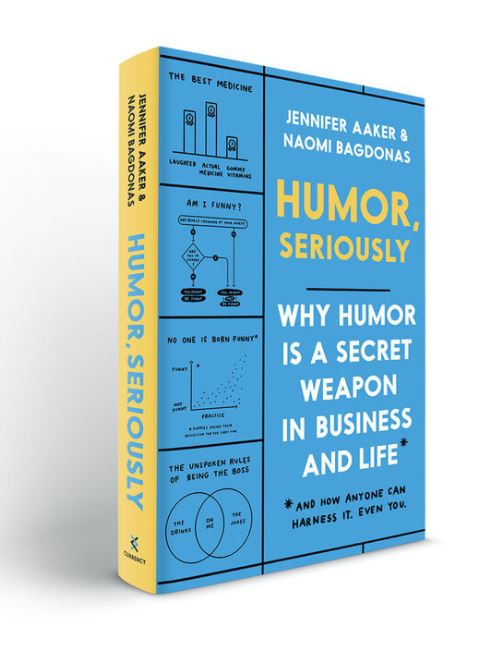“Laughter is like exercising, meditating and having sex at the same time.”
Naomi Bagdonas, Lecturer at the Stanford Graduate School of Business and Executive Coach
- Leaders with a sense of humour make more money
- Top executives (98 per cent) prefer employees with a sense of humour, and 84 per cent believe that these employees do better work. But even for those who intuitively understand humour’s power, few know how to wield it with intention.
Did you know that the number of times we laugh each day plummets at the age of 23? And by the same token, we lose a positive impact on our health, so much that we could be 30% more susceptible to disease and cutting our life span by as much as eight years. These are some of the findings that have come out of a new book called Humor, Seriously.
Co-authors Dr Jennifer Aaker, the General Atlantic Professor at the Stanford Graduate School of Business, and Naomi Bagdonas, a Lecturer at the Stanford Graduate School of Business and an Executive Coach, spell out everything we need to know about how humour to “upgrade” our lives.
In Humor, Seriously, they draw on findings by behavioural scientists, world-class comedians, and inspiring business leaders to reveal how humour works and how you can use more of it, better.
Aaker and Naomi Bagdonas teach the popular course Humor: Serious Business at the Stanford Graduate School of Business, where they help some of the world’s most hard-driving, blazer-wearing business minds build levity into their organisations and lives.
According to Bagdonas, when we laugh, our brains release a cocktail of hormones. We get endorphins. We feel calmer and less stressed. We also release oxytocin – that feel-good hormone.
“In essence, laughter is like exercising, meditating and having sex at the same time,” says Bagdonas in a televised interview on Good Morning America (see the full interview in this article’s featured video below).
“These changes in our physiology have very real health benefits for us. One study conducted over 15 years found that people with a sense of humour are 30% more resistant to severe disease and they live on average eight years longer,” she says.
Where do we go for a laugh?

Bagdonas suggests we think about what makes us laugh, and whether that laugher may come from someone we live with, a friend or relative, someone we Zoom with, or even our favourite sitcom show. Seek out those laughs.
Laughing with v. Laughing at someone
Laughing with someone, not at them, is a show of empathy, say the authors. This works well in professional and personal relationships.
When you laugh with someone, it says, ‘I see you, I get you’. You can help flex that empathy muscle, according to the authors, by thinking of ways that you can laugh together more.
One way is to get to know each other’s humour style — the stand-up, the sweetheart, the sniper or the magnet. Snipers, for example, are edgy and sarcastic, where magnets are uplifting and charismatic. The more you know these styles, the easier it is to read the room and drop that so bad it’s good Dad joke. And don’t forget the kids, because Aaker and Bagdonas say there is nothing more powerful than a parent making their kid feel like they’re funny. And for kids to know how to use their sense of humour and create those empathetic moments with others.
What’s your humour style?
What makes us laugh and how we make others laugh also says a lot about us or ‘humour style’, which can help us get more out of our personal and professional relationships. On their website, you can even take a Humour Typology quiz. Parents should also consider how sense of humour can be used at home, and even encouraging their kids to take the quiz. Everyone who takes a quiz gets an analysis of their humour style. You just have to sign up to get the results by email.
How do we incorporate some fun in our ‘serious’ work environment?

Aaker says it is important to know that the book’s objective is not to teach you how to be funny, but rather just “showing up as a human”. So the pressure is off. However, she says research supports why humour is important in the workplace – even in remote working and finalising that sales pitch.
Research has found that leaders that rate themselves as having a sense of humour, rather than being funny, tend to be 27% more motivating. Their employees are 15% more engaged at work and their teams tend to be twice as effective. Leaders with a sense of humour also make more money. In one study researchers showed adding a light-hearted line to the end of a sales pitch increases the propensity to pay and in some cases pay 18% more. So, there is still a place for those ‘bad Dad jokes‘ – you just may need to prepare to laugh with yourself on some of them and end on a smile.
Corporate myths and humour
In the book, it brings up the myth that many of us take as truth and that is in today’s corporate world we have to be serious all the time in order to be taken seriously.
Research tells a different story. “Humour can be one of the most powerful tools we have for accomplishing serious things. Studies show that humour makes us appear more competent and confident, strengthens relationships, unlocks creativity, and boosts our resilience during difficult times.”
Plus, it fends off a permanent and unsightly frown known as “resting boss face.”
- Humour is vastly underleveraged in most workplaces, impacting our performance, relationships, and health.
- Salespeople who add a hint of humour at the end of their sales pitches are 18% more successful
- People with a sense of humour are 30% more resistant to severe disease
- Laughing with someone, not at them, is a show of empathy and creates meaningful moments and relationships
- You can take a Humour Style Quiz and Join a Workshop to harness your sense of humour and use it to your benefit in life, love and work
Liked this article? Spread the word and be sure to sign up to our free newsletter (just click below). Barack and Mckayla’s office humour will lead you in the right direction.
Humor, seriously was first made available on February 2nd, and is sold in most US online book retailers and on Amazon. A Kindle version is also available.

Aaker and Bagdonas have written this book to unpack the theory and application of humour:
- What makes something funny and how to mine your life for material.
- They show how to use humour to make a strong first impression, deliver difficult feedback, persuade and motivate others, and foster cultures where levity and creativity can thrive.
- How to keep it appropriate and recover if you cross a line.
- There’s even a Bootcamp, which you can learn more about here.
To watch the authors chat about their book, check out this interview from Good Morning America.


